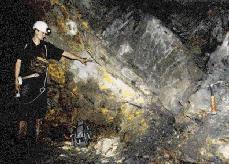
Oklo: Ancient African Nuclear Reactors
(Clearwisdom.net)
Explanation: The remnants of nuclear reactors nearly two billion years old were found in the 1970s in Africa. Pictured above is Fossil Reactor 15, located in Oklo, Gabon. Uranium oxide remains are visible as the yellowish rock. Oklo by-products are being used today to probe the stability of the fundamental constants over cosmological time-scales and to develop more effective means for disposing of human-manufactured nuclear waste.
Of the seventeen known fossil reactors, 9 have been completely mined out.
Reactor zone 15 is the only reactor which is accessible underground through a tunnel bored into the existing mine pit. The remains of fossil reactor 15 are clearly visible in this pictures as the light grey/yellow colored rock (which is mostly uranium oxide) being pointed to by the geologist.
The light colored streaks in the rocks above the reactor are quartz which has been crystallized from the (hot) underground waters circulating around during and after the reactor's operating lifetime.
There are also many minor fractures and veins run through the rocks. Use of isotopic fingerprinting techniques show that all of there were also present 2000 million years ago when the reactors were operating.
Despite these highly undesirable geological features and circumstances (from a geological rad waste repository point of view) the reactors still retained a remarkable amount of the fission products inside the reactor zones themselves.
The fractures were important for the operation of the reactors as the water circulating around and through the reactors would have helped to keep the reactors cool and chemically and physically stable.
Views expressed in this article represent the author's own opinions or understandings. All content published on this website are copyrighted by Minghui.org. Minghui will produce compilations of its online content regularly and on special occasions.
Category: Perspectives









